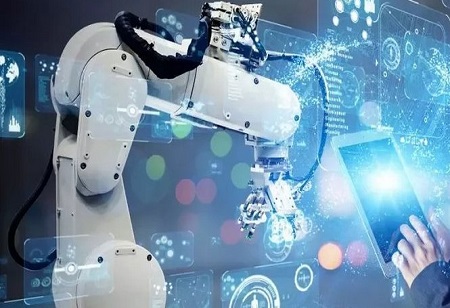The
Manufacturing industry has evolved to a great extent over the past decade. Manufacturing is clearly going down the path of information & automation along with advanced technologies fueling growth of the manufacturing industry forward. Technologies that include
AI/ML sensors & IoT and the likes are transforming the way the manufacturing industry operates and due to this it is highly crucial to understand the trends that are bolstering the industry forward so that businesses can adapt & grow.
As enterprises continue to work in several ways in order to cut costs, enhance efficiencies & keep pace with evolving customer demands, businesses today are looking at smart tools for helping them process their manufacturing techniques.
Smart manufacturing covers a wide range of different technologies and these are segmented into robotics, AI, & IoT. There are several technologies which exist within these categories, & often they overlap in several ways. For instance, most of the AI technologies in manufacturing depend on data rendered by IoT sensors.
Robotic process automation
Although the manufacturing industry has witnessed industrial automation that is empowered by physical robots there is still a need for disruptive technology that include Robotic Process Automation in manufacturing which can facilitate businesses for focusing more on product innovation as well as core strengths rather than daily repetitive works that are crucial but mundane in nature.
Robotic Process Automation makes the automation of rule-based operations to improve process execution speed as well as accuracy. Furthermore, Robotic Process Automation solutions are not only easy to implement but they also do not need any coding skills as well. Robotic Process Automation also integrates with current legacy systems seamlessly without any costly as well as time-consuming software development.
Organizations can get started with a pilot project by selecting a particular set of operations & look
for tangible as well as measurable results within a few days of their implementation. Advantages of Robotic Process Automation in the manufacturing industry comprise up to forty per cent deduction in operational cost, optimized employee performance & significantly lower downtime as well as increased quality and increased control over processes.
Digital twin in smart manufacturing
An initial area of focus for implementation of the digital twin has been asset lifecycle management. While maintaining assets in the industry has not only been a time-consuming task conventionally but also expensive. However, it is critical to equipment as well as system uptime. Currently, the maintenance technicians can leverage technologies that include Augmented Reality which lets them for accessing virtual engineering models & overlay these over the physical equipment on which they are conducting maintenance by leveraging using specialized Augmented Reality goggles/glasses. This facilitates them to optimize the most accurate as well as up-to-date engineering, making sure that the right maintenance & performance specifications are conducted in an efficient manner. These maintenance methods that are depended on merging virtual and physical environments must be used to factory production systems, machines and work cells as well.
Furthermore, products, machines, production systems as well as work cells can be virtually simulated for testing & validating physical systems before assembly & installation. Also, the virtual commissioning of production automation – is combining with the highly expansive scope of the digital twin.
Internet of Things
Most of the people think that AI is a technology that is a game changer on its own. However, AI & ML technologies depend majorly on data and one of the main reasons why AI has become so important in manufacturing environments in the past decade is owing to the advances in IoT. To be more specific, the proliferation of sensors in the factories has enabled in powering Artificial Intelligence applications such as automated power management, predictive maintenance, as well as computer vision-powered quality assurance.
Both the opportunities & the challenges which are presented by IIoT for industries that include oil & gas, manufacturing, energy & construction are several and are varied. Prior to adopting Internet of Things, it’s imperative that organizations understand the opportunities that are underlying and major challenges which exist. Let us look at how connected machines build links in the digital value chain. By using connectivity the performance of machines can be optimized via its complete lifecycle with over-the-air firmware & this improves the efficiency & decreases costs for the manufacturer. Two-way data communication also lets the machine manufacturer to collect data for Research & Development. This data can be used for identifying advancing trends related to the user behavior, for refining current services & eventually come up with new ones.
When machine service tasks could be streamlined with a smart product & if any problem occurs, the machine can send alarm/signals to the operator as well as service providers. The manufacturer can strengthen their bonds with their dealer as well as service ecosystem with a connected offering and this makes the manufacturer highly appealing to work with, while rendering a highly consistent customer experience.
